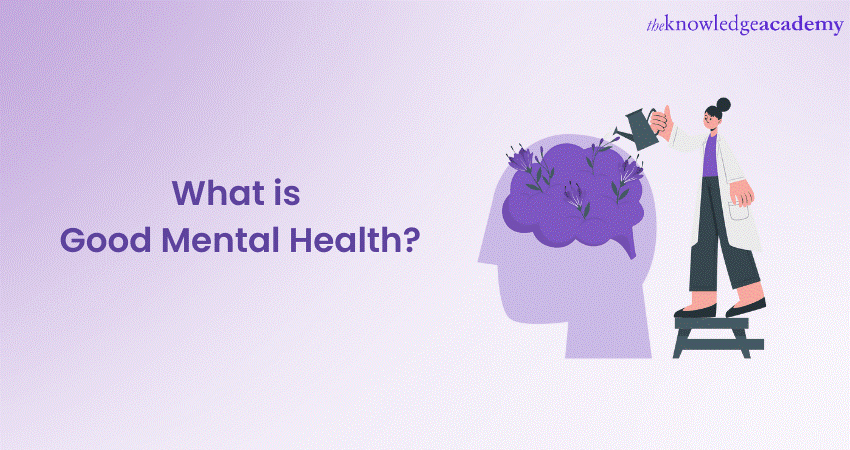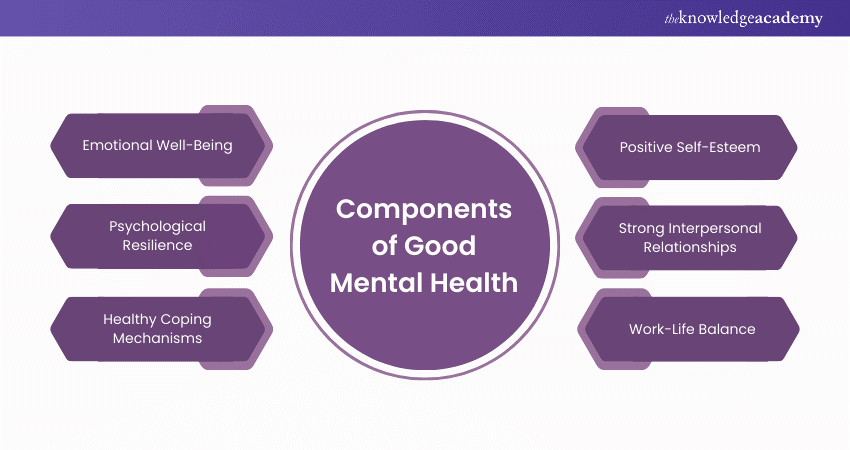We may not have the course you’re looking for. If you enquire or give us a call on 01344203999 and speak to our training experts, we may still be able to help with your training requirements.
We ensure quality, budget-alignment, and timely delivery by our expert instructors.

Mental Health goes at the core of our overall wellbeing. Its importance is often neglected by many people. The result can be depicted from this report, which states that rates of depression are significantly higher than prior to the pandemic across the UK. Understanding the signs of Good Mental Health is the need of an hour, triggered by the competitive ecosystem as an additional factor.
In this blog, we’ll shed a spotlight on Good Mental Health, its components and signs, and ways to cultivate it in our daily lives. Let’s embark on this thought-provoking journey together!
Table of Contents
1) Good Mental Health Definition
2) How Are Resilience and Mental Health Connected?
3) Components of Good Mental Health
4) Signs of Good Mental Health
5) Daily Activities to Improve Mental Health
6) Conclusion
Good Mental Health Definition
Good Mental Health definition is not as straightforward it seems. Infact, it's a complex and multidimensional concept that can vary for each person.
To define in simple words, good mental health is a state of well-being that allows you to cope with the normal stresses of life, such as managing work demands, handling interpersonal relationships, dealing with unexpected challenges, and maintaining a balance between personal and professional responsibilities, as explained in the Mental Health Guide. which is central to the Mental Health Nurse Job Description.
Good Mental Health has several benefits, which include:
1) Managing a range of positive and negative emotions.
2) Carry out everyday tasks and look after yourself.
4) Build and manage healthy relationships with others.
5) Adapt to changing circumstances and deal with challenges.
6) Feeling confident in yourself and your future.
How Are Resilience and Mental Health Connected?
Good Mental Health is not about being happy all the time or avoiding negative emotions. It's about coping with life’s challenges, fatal losses, and sudden changes in lives in a better way. Good Mental Health helps us to recover from these difficulties and cope with them better. This mental toughness ability is called resilience.
Resilient people have the ways to deal with challenging situations and keep a robust, Positive Attitude.They can easily adapt to changing circumstances, stay focused on their goals, and work effectively under extreme pressure. This ability makes them receptive to new experiences and less anxious about the unknown. They have hope and confidence in their ability to solve their problems, even if they have no idea where to start.
Grab the Nutrition and Mental Health PDF and start making healthier, mindful choices today!
Components of Good Mental Health
Mental Health isn't a one-size-fits-all concept; it's a complex relationship of various components that contribute to a person's overall psychological well-being. These components collectively define how effectively an individual can overcome life's challenges, maintain a positive outlook, and build meaningful relationships. By incorporating Elements of a Healthy Lifestyle, one can enhance these abilities and foster good mental health. Navigating forward, let's delve deeper into the key components of good mental health:

Emotional Well-Being
Emotional well-being involves recognising, understanding, and managing our emotions in a healthy manner. It is related to avoiding negative emotions and learning to handle them constructively. People with good emotional well-being can identify their feelings, properly convey them, and regulate their emotional responses. This component allows us to experience a wide range of emotions while maintaining emotional stability.
Psychological Resilience
Psychological resilience is the capability to adapt and rebuild from adversity, stress, and challenges. It deals primarily with avoiding difficulties and developing the skills and mindset to overcome them. Resilient people can maintain a sense of hope, optimism, and control even during challenging times. This component fosters mental strength, adaptability, and the capacity to learn and grow from setbacks.
Healthy Coping Mechanisms
Life is full of stressors, no matter how meagre. Good Mental Health involves having effective coping mechanisms to deal with these stressors. Healthy coping strategies might include problem-solving, seeking social support, engaging in hobbies, practising relaxation techniques, and maintaining a balanced lifestyle. These mechanisms enable us to effectively manage stress, prevent burnout, and maintain a sense of well-being.
Positive Self-Esteem
Positive self-esteem is the foundation of a positive attitude toward oneself. It deals with valuing oneself, having confidence in one's abilities, and maintaining a realistic and positive self-perception. Individuals with positive self-esteem are less susceptible to criticism and setbacks. This component encourages self-compassion, self-acceptance, and a healthy sense of self-worth.
Strong Interpersonal Relationships
Healthy relationships are pivotal for Good Mental Health. Positive interactions with family, friends, and colleagues provide a sense of belonging, emotional support, and opportunities for meaningful connection. Nurturing relationships contributes to reduced feelings of loneliness and isolation, fostering emotional well-being and overall life satisfaction.
Work-Life Balance
Balancing personal life and work is crucial for maintaining mental well-being. Keeping this balance helps prevent burnout, reduce stress, and enhance happiness. Good Mental Health requires time for relaxation, leisure, and pursuing personal interests outside of work commitments. Therefore, finding this equilibrium supports long-term psychological health.
Nail Your Next Interview! Explore our curated list of Mental Health Support Worker Interview Questions to ensure you're fully prepared.
Signs of Good Mental Health
Now that we know the definition of Good Mental Health and its components, we will explore the various signs associated with it. The sign of Good Mental Health is reflected in four broad categories of signs, as described below:
Emotional Signs
Emotional signs are the ones that are associated with the core mental health conditions, such as
1) Stability: Balanced and stable emotions, even in challenging situations
2) Positivity: An optimistic outlook and hopeful attitude towards the future
3) Resilience: Bouncing back from setbacks with determination and growth
4) Empathy: Understanding and acknowledging others' emotions
Behavioural Signs
Behavioural signs indicate behavioural abnormalities, such as
The following are some of the behavioural signs that reflect Good Mental Health:
1) Problem-solving: Constructive approach to challenges, seeking solutions
2) Coping: Healthy strategies to manage stress and difficulties
3) Relationships: Positive interactions and nurturing connections
4) Self-care: Prioritizing self-care activities that promote physical and mental well-being.
Get tips for a balanced life with the Health and Wellbeing PDF.
Cognitive Signs
Cognitive abilities relate to how we process information in our minds. It includes
The following are some of the cognitive signs that reflect Good Mental Health:
1) Clear thinking: Coherent thought patterns and effective decision-making
2) Adaptability: Openness to change, flexible thinking, and learning
3) Focus: Concentration on tasks and information processing
4) Resilient mindset: Viewing mistakes as opportunities for growth
Social Signs
Social signs are the symptoms that deal with abnormalities in social interactions. The following are some of the social signs that reflect Good Mental Health:
1) Relationships: Healthy connections and effective communication
2) Empathy: Understanding and compassion towards others
3) Conflict resolution: Constructive handling of conflicts
4) Engagement: Active participation in social activities and communities
Daily Activities to Improve Mental Health
1) It takes a combination of actions centred on meaningful activities, healthy thinking, goals and plans, healthy routines, and social connections to take care of your mental health on a daily basis. Here’s a list of healthy activities that you should follow:Meaningful Activities: Engaging in activities that bring you joy and a sense of accomplishment—from reading a good book to spending time in nature—provides a break from our daily challenges and allows us to recharge.
2) Healthy Thinking: Your thoughts have a profound impact on your Mental Health. Maintaining a positive and realistic perspective about life, eliminating negative thoughts, and practising self-compassion. Instead of focusing on negativity, try to be kind to yourself and show appreciation for what you have.
3) Goals and Plans: Setting achievable goals gives you a sense of purpose and direction. You can set any type of goals, such as short-term or long-term, professional or personal. They help you get past your past struggles by giving you motivation and an excuse to look forward to the future.
4) Healthy Routines: Establishing daily routines can provide stability and structure. Simple habits like maintaining a consistent sleep schedule, eating nutritious meals, and regular exercise contribute to overall well-being. Routines associated with work, family, and personal care provide a sense of order and reduce stress.
5) Social Connections: Maintaining relationships with friends and family is vital. Sharing experiences and emotions and seeking support from loved ones can offer validation and a sense of belonging. Social connections act as a safety net during challenging times.
Enhance Your Resilience and Well-being with our Mental Health and Wellbeing Training – Sign up and build a healthier workplace today!
Conclusion
We can live resilient, happy, and meaningful lives with rich relationships when we recognise the varied aspects of Good Mental Health. It has abundant benefits, ranging from social harmony to individual well-being, including physical health, creativity, and a supportive community. By putting Mental Health as our major priority, we can inspire ourselves and others to live lives of balance, compassion, and a shared commitment to holistic well-being.
Gain proficiency in mental health with our Psychology Course and join now on a journey toward enhanced well-being!
Frequently Asked Questions
What is Positive Mental Health?

Positive mental health is the ability to remain emotionally and mentally strong by staying resilient against stresses, life's challenges, and unhealthy relationships, among other adverse factors.
What Is a Good Mental Health Mindset?

A Good Mental Health mindset is a positive and balanced way of thinking that allows one to manage stress, stay resilient, and maintain emotional well-being.
What are the Other Resources and Offers Provided by The Knowledge Academy?

The Knowledge Academy takes global learning to new heights, offering over 3,000 online courses across 490+ locations in 190+ countries. This expansive reach ensures accessibility and convenience for learners worldwide.
Alongside our diverse Online Course Catalogue, encompassing 19 major categories, we go the extra mile by providing a plethora of free educational Online Resources like News updates, Blogs, videos, webinars, and interview questions. Tailoring learning experiences further, professionals can maximise value with customisable Course Bundles of TKA.
What is The Knowledge Pass, and How Does it Work?

The Knowledge Academy’s Knowledge Pass, a prepaid voucher, adds another layer of flexibility, allowing course bookings over a 12-month period. Join us on a journey where education knows no bounds.
What are the Related Courses and Blogs Provided by The Knowledge Academy?

The Knowledge Academy offers various Mental Health Courses, including the Mental Health and Wellbeing Training, and the Psychology Course. These courses cater to different skill levels, providing comprehensive insights into How to Meditate for Beginners: A Step-By-Step Approach.
Our Health & Safety Blogs cover a range of topics related to Workplace Safety, Compliance, and Wellness, offering valuable resources, best practices, and industry insights. Whether you are a beginner or looking to advance your Health and Safety skills, The Knowledge Academy's diverse courses and informative blogs have got you covered.
Upcoming Business Skills Resources Batches & Dates
Date
 Mental Health and Wellbeing Training
Mental Health and Wellbeing Training
Fri 6th Jun 2025
Fri 8th Aug 2025
Fri 3rd Oct 2025
Fri 5th Dec 2025






 Top Rated Course
Top Rated Course



 If you wish to make any changes to your course, please
If you wish to make any changes to your course, please


